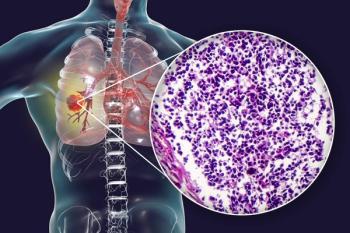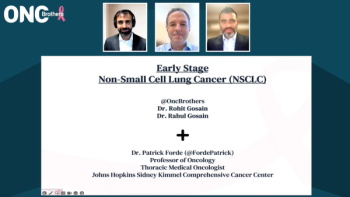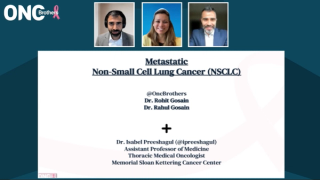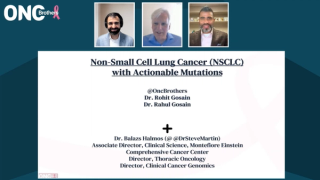
Non-Small Cell Lung Cancer (NSCLC)
Latest News

Latest Videos

CME Content
More News

Martin Dietrich, MD, PhD, discusses the secondary analysis from MARIPOSA evaluating first-line amivantamab plus lazertinib in patients with advanced EGFR-mutant NSCLC.

Following the 2024 ASCO Annual Meeting, medical oncologists share insights on how the availability of the FLAURA2 treatment regimen has impacted the treatment of patients with advanced EGFR-mutant non–small cell lung cancer (NSCLC).

Phase 2 data support the National Medical Products Administration’s approval of fulzerasib for those with KRAS G12C–mutated NSCLC in China.

Findings from the MARIPOSA trial support the FDA approval of frontline amivantamab/lazertinib in advanced or metastatic EGFR-mutant NSCLC.

Results from the phase 3 AEGEAN trial led to the approval of neoadjuvant and adjuvant durvalumab for patients with resectable NSCLC.

Investigators developed a risk model to assess whether upfront surgery can improve prognoses in a subset of cN2 diseases such as single-station N2 NSCLC.

Investigators are on track to launch part 2 of the phase 1 Deltacel-01 trial in September 2024.

The combination therapy was well tolerated and had a safety profile consistent with pembrolizumab monotherapy, while no new safety concerns were identified.

Results from the LUMINOSITY trial show an enriched overall response rate for telisotuzumab vedotin among patients with c-Met high overexpressing tumors.

The safety profile of LP-300 plus chemotherapy in the phase 2 HARMONIC trial was comparable with prior reports of chemotherapy alone.

The safety profile of entrectinib with liquid biopsy in the BFAST study was consistent with prior reports for patients with ROS1-positive NSCLC.

The phase 3 EVOKE-01 study found that OS improved numerically, but not statistically significantly, in sacituzumab govitecan vs docetaxel with a similar safety profile.

Patrick Forde, MBBCh, and the Oncology Brothers discuss treatment practices for patients with unresectable non–small cell lung cancer.

Medical oncologists share expert perspectives on treatment paradigms for patients with early-stage NSCLC and actionable mutations.

The Oncology Brothers and Patrick Forde, MBBCh, outline immunotherapy options for patients with non–small cell lung cancer and the role of PD-L1 in informing treatment decisions.

Patrick Forde, MBBCh, joins the Oncology Brothers, Rahul Gosain, MD, and Rohit Gosain, MD, to discuss treatment practices for patients with stage IB and beyond non–small cell lung cancer (NSCLC).

Following a spirited debate, Joshua K. Sabari, MD, presents the winning team with the coveted title of victors of this CancerNetwork® Face-Off event.

Experts on non–small cell lung cancer reflect on clinical trial data to weigh treatment options for patients with EGFR-mutated non–small cell lung cancer.

Jyoti D. Patel, MD, and Rajat Thawani, MBBS, tackle the question of whether neoadjuvant therapies will replace surgery plus adjuvant treatment for patients with resectable non–small cell lung cancer.

Robert B. Cameron, MD, PhD, offers insights on a patient with KRAS G12C non–small cell lung cancer.

Focusing on PD-L1-low NSCLC, Faith Abodunrin, MD, discusses the decision to rechallenge with immunotherapy.

Jyoti Patel, MD, presents the case of a patient with EGFR-mutated non–small cell lung cancer requiring treatment following osimertinib.

Initiating a conversation on patient cases, Divya Gupta, MD, presents the profile of a 76-year-old woman with ROS1+ metastatic non–small cell lung cancer.

Divya Gupta, MD, presents data from CHRYSALIS-2 focused on amivantamab plus lazertinib in atypical EGFR-mutated advanced non–small cell lung cancer.

Robert B. Cameron, MD, PhD, reviews data from the LAURA trial investigating osimertinib in patients with EGFR-mutated stage III unresectable NSCLC.




































